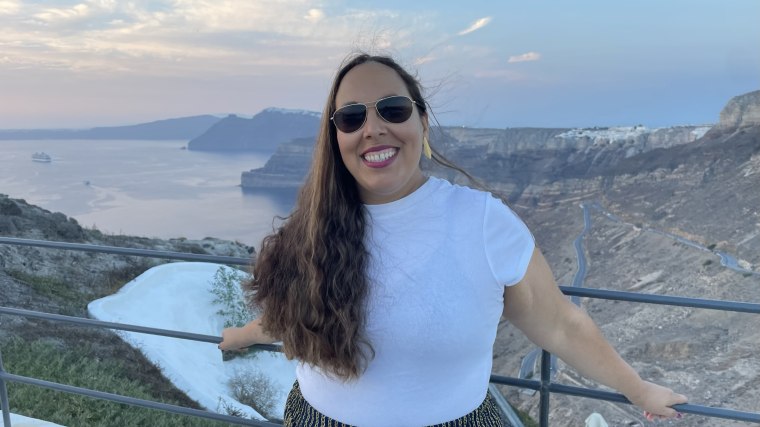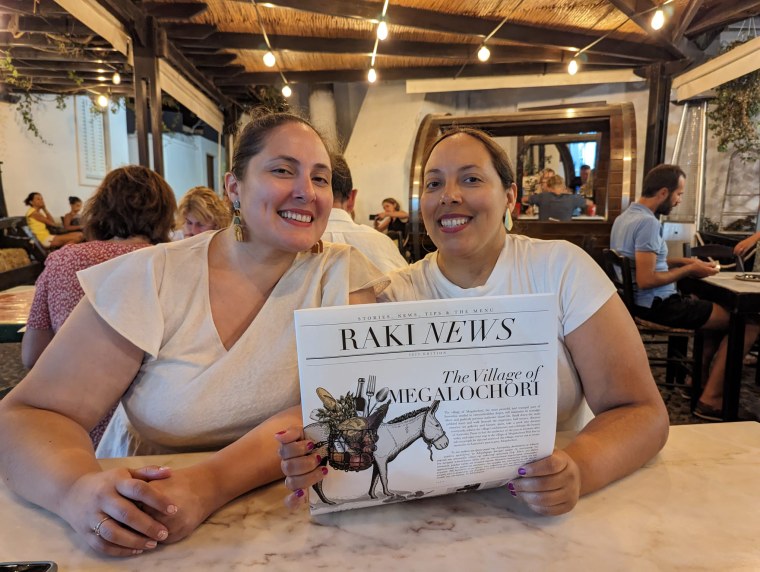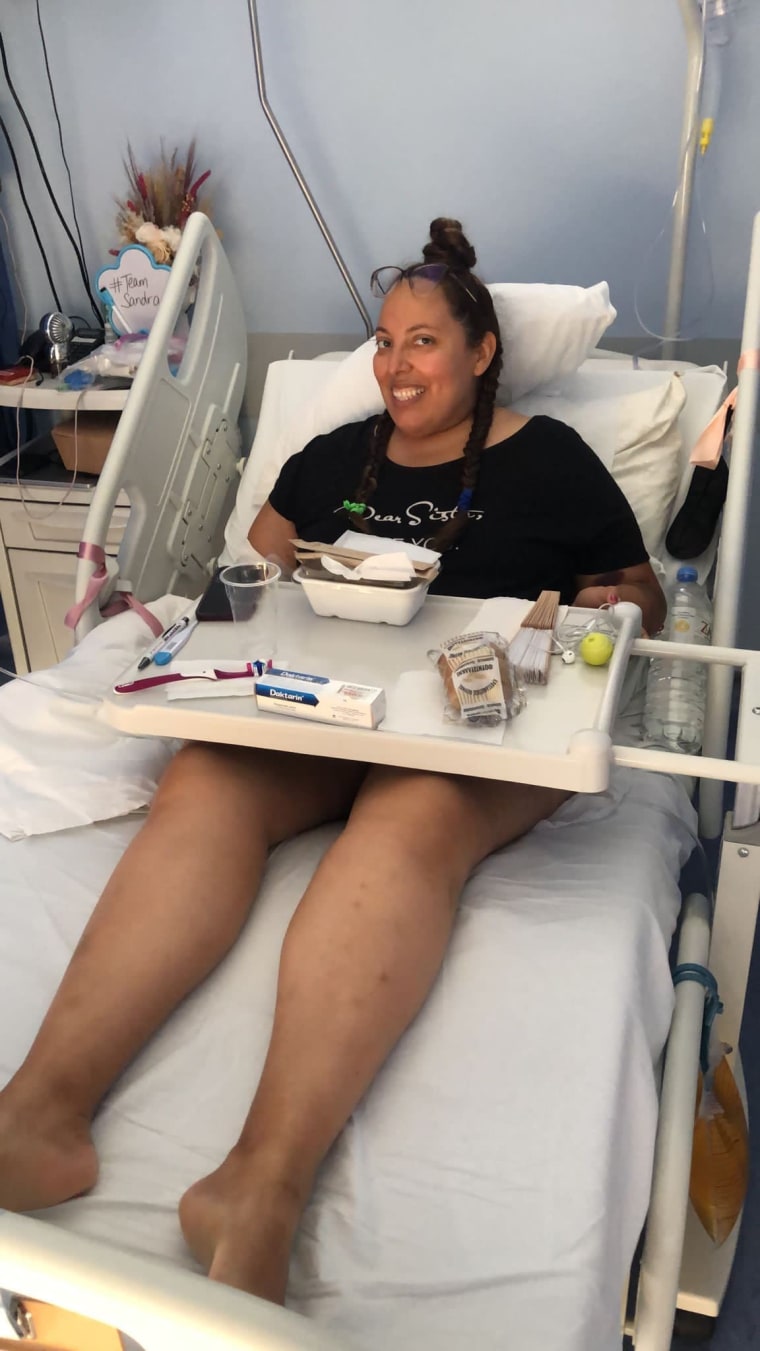
When Sandra Gutierrez arrived in Crete, Greece, for a destination wedding in late August, she noticed a swath of bruises on her arms and legs. But with her history of anemia, a blood condition that can cause a rash, she didn’t worry too much.
Still, at the recommendation of a physician assistant friend, she got her blood tested, just to be safe. The results led to Gutierrez being diagnosed with acute lymphoblastic leukemia during her trip. She's currently hospitalized in Crete and unable to travel.
Watch NBC6 free wherever you are

“I have to be here for at least a month,” Gutierrez, 43, of Seattle, tells TODAY.com. “With acute lymphoblastic leukemia, the sooner the treatment, the better, and it has to be in-hospital treatment.”
Get local news you need to know to start your day with NBC 6's News Headlines newsletter.
Navigating health care in a country where she doesn’t speak the language has been difficult. Gutierrez has been paying out of pocket for treatment and is unsure if her insurance will reimburse her. She had to cancel her return flight, and there’s only a brief window of time where she can safely travel back to the United States.
“There are certain things my body has to do be before they can say I can safely go back (home) on a commercial flight,” she says.
A long menstruation revealed something wrong
Health
Leading up to her friend’s wedding in Greece, Gutierrez had a period that last for two weeks. But she’d had irregular periods before, so she didn’t feel concerned.
In the past, she'd taken birth control to manage her menstruation, but she developed a pulmonary embolism, a blood clot in the lungs, a few years ago. Since then, she's stopped using birth control and started taking other precautions to avoid blood clots, such as taking a baby aspirin before flights.
When Gutierrez arrived in Crete before the wedding, she joined a bachelorette party. The next day, Aug. 26, she woke up to bruises splattered all over her arms and legs.
“I noticed … an anemia rash, which is like purple (spots),” she says. “I called one of my best friends, who is a PA, and she’s like, ‘Sandra, go get your blood done.’”

Gutierrez visited a local lab, and the staff immediately told her to see a doctor, who was also concerned about her.
“When I got to the doctor, he was like, ‘You need to go to the emergency room,’” she recalls.
The whole time, Gutierrez grappled with the language barrier. To make sure she understood, she sent her blood results to her physician assistant friend, who agreed the results weren’t normal.
In the emergency room, it became clear Gutierrez was very ill. While her cancer diagnosis wasn't confirmed for a few more days, doctors suspected based on her abnormal blood counts that something was seriously wrong.
“Our world got turned upside down,” she says. “The doctors initially didn’t believe that I was not in pain. But I swear, I was not in pain. I (had) a lot of energy. I didn’t see any other signs.”
She did notice what she thought was jet lag after arriving in Crete. But doctors explained that her abnormal blood counts had caused her fatigue. She was told she couldn't leave the hospital.
“I knew I was in trouble," she recalls.
Stuck in Greece for treatment
Gutierrez missed her friend’s wedding on Aug. 27 and all the fun excursions she and her sister, Julissa Gutierrez, had planned. On the Tuesday following the wedding, doctors finally diagnosed her with acute lymphoblastic leukemia.
“It was an initial shock," Gutierrez says.
She immediately asked how she could return home for treatment.
“The shocking thing was (they said), ‘You can’t leave at all. You cannot leave because you will hemorrhage. You cannot even go to Athens right now,’” she says, adding that she was “thrust into another country, another medical system.”
What’s more, she developed a complication called disseminated intravascular coagulation, which causes abnormal blood clotting. Fortunately, doctors gave her plasma, red blood cells and platelet transfusions and successfully treated it.
As Gutierrez underwent treatment in Greece, she updated her friends, and many reached out to help. One connected her to a doctor in New York City so she could ask her questions. Gutierrez needs to stay in Greece another few weeks to continue with treatment, and if her platelets normalize, she can travel home.
“We’re moving in the right direction,” she says. “I totally feel a lot better than I did.”
Still, figuring out how to pay has been a struggle. She says that because she is not a citizen of Greece, she needs to pay for her treatment upfront by wire transfer. Julissa Gutierrez stayed to help.
“Americans are not set up to pay bills in the European Union,” she says. “They do it very differently.”

Acute lymphoblastic leukemia
Acute lymphoblastic leukemia, also referred to as acute lymphocytic leukemia and ALL, is a “relatively rare” type of bone marrow cancer in adults, Dr. Gail Roboz, professor of medicine at Weill Cornell Medicine and director of the leukemia program at New York Presbyterian Hospital, tells TODAY.com. A friend of a friend connected Gutierrez to Roboz.
Bone marrow “makes normal white blood cells that fight infection, normal red blood cells that carry around oxygen and give you energy, and normal platelets, which are little tiny cells that help you clot,” Roboz explains. But in patients with leukemia, leukemic cells take over bone marrow function, reducing the blood’s ability to fight infection, carry oxygen and clot correctly.
A friend of a friend connected Gutierrez to Roboz. The two have not met, but Gutierrez has asked Roboz questions about her diagnosis and the therapies she’s receiving. When Gutierrez returns to the United States, she plans to finish her treatment with Roboz.
ALL occurs suddenly and is considered aggressive. It has "acute" in its name because patients can "go from fine to unbelievably sick with potentially life-threatening signs and symptoms" within two weeks to a month, Roboz explains.
“This disease comes on quick and strong," she adds. ALL symptoms include:
- Low platelet count
- Bleeding
- Bruising
“It could be menstrual bleeding. It could be a nosebleed that won’t stop. It could be gastrointestinal bleeding,” Robox says. “It could just be bruising all over the place.”
But Roboz stresses that ALL in adults is rare. Numerous conditions can cause prolonged periods, for example, so patients with this symptom shouldn’t assume they have cancer (though they should still talk to their doctor).
Once diagnosed, timely treatment is important to help ALL patients reach remission.
ALL and plane travel
It is dangerous for patients with ALL to fly, which is why Gutierrez is stuck, Roboz says.
People with low blood counts, like Gutierrez, have an increased risk of brain or lung hemorrhages (bleeding from a damaged blood vessel), both of which are potentially life-threatening. Pressure changes that occur in flight can worsen such bleeds.
“This is an area that makes doctors really nervous,” Roboz says. “You’re taking someone who is a young patient who has a potentially curable disease, and you’re going into an unknown risk of getting onto a flight.”
Even a medical evacuation flight is not equipped for a bleed like that, Roboz adds.
But with treatment, Gutierrez’s blood counts should return to normal, allowing her to fly. Doctors initially told her this would take about a month, so if all goes according to schedule, she should be able to go back to the U.S. in late September.
“We are very, very hopeful,” Roboz says. “It’s terrifying for anything like this to happen anywhere. But to be very far from home (makes it tougher).”
Dreams of home
Gutierrez remains upbeat despite all the stress she’s facing. The support she’s received has felt overwhelming. A GoFundMe to help her pay for her out-of-pocket expenses has generated over $95,000.
“Everybody’s reaching out to me, so that has energized me and given me perspective,” she says. “I’m taking this as a blessing where I get to connect with folks that I wouldn’t have otherwise.”
Having Roboz as a sounding board helps her when she worries, and Gutierrez is hopeful she'll soon be able to go to New York to finish treatment. Much of her family lives in the area, and she anticipates she’ll need the support.
Gutierrez hopes her story encourages others to pay attention to their bodies.
“(Take) that time to slow down and really (listen) to your body,” she says. “I wasn’t slowing down enough, and I really think it’s important for women to take care of these mysterious illnesses.”
CORRECTION (Sept. 22, 2023, 8:26 a.m. ET): A previous version of this story misstated that Gutierrez's period lasted for three weeks. It lasted for two.
This story first appeared on TODAY.com. More from TODAY:



